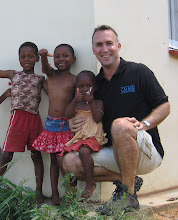Last Thursday we visited a community called Sitsatsaweni -- a very poor, remote settlement about 15 miles from where we live. It's not a village in any sense, just a bunch of homesteads scattered over a wide area of probably ten square miles. The day consists of driving from homestead to homestead, often down tiny, barely visble dirt tracks or footpaths. Scott has become very good at navigating these tracks where most sane drivers would fear to go. At each homestead, the team of three or four nurses assesses the patient and dispenses medication as needed. In some cases the patient is given a referral and money to come into the hospital for further treatment, and in really dire cases, we'll put the patient in the back of the truck and bring him or her back to the hospital with us.
A major part of the home visits consists of distributing food to the homesteads on an "as-needed" basis. Patients on HIV drugs receive the most: a food pack consisting of beans, peanuts, cooking oil, salt, maize meal, and milk. Other patient will receive only the maize meal or milk. The team takes only ten full meal packs a day, along with twenty additional packs of maize meal, and ten 2-litre bottles of milk. The HBC team visits each community once a month, and for some patients this is their only food delivery of the month, so you can understand that in many cases the patients and their families prize these food drop-offs even more highly than the medical care they receive.

On Thursday, as often happens, by the time we saw the last patients of the day, we were entirely out of food. It was an exceptionally hot day, and everyone in the truck, myself included, was tired and ready to head home. We thought we'd seen our last patient and we were all relieved to be headed back to the hospital, when suddenly a thin young woman materialized out of the dense bushes and grass by the side of the road. She held out her medical papers indicating that she is a regular patient and wanted to be seen. Everyone in the truck silently groaned, but Scott pulled over and got out to examine her. She is an HIV patient, but is not acutely ill (aside from being malnourished); she had come primarily to pick up her monthly food pack for herself and her three children. Her homestead is well back from the road and she had walked a ways to meet us when she'd seen the truck in the distance. Unfortunately we had no food at all left to give her. This poor woman looked miserable to begin with, but when we told her we had no food her face fell even further and she looked like the very picture of desperation.
As I wrote in my previous post, people here often mistake me for a doctor, she turned to me and gave me a long, pleading, desperate look. There was nothing any of us could do but get back into the truck and head off. As Scott started the engine, I remembered that we had a few remaining lollipops which we bring along to distribute to the young children at each homestead. I grabbed the bag and found four lollipops inside -- enough for her and her three children to have one each. I told Scott to wait a moment and got out of the truck to hand them to her. As I was doing so, however, I was overcome with guilt that they were all I had to give her. She received them gratefully, joining her hands together to take them from me in the traditional sign of gratitude and respect. We all drove away feeling rotten. Despite all the food we'd distributed that day, or any day, it's the ones you can't help that remain with you.
A postscript: Neither Scott nor I could get this woman and her three children off our minds that night or over the weekend. We talked about it and decided that we had to do something. We would have simply bought some groceries and delivered them on our own, but we had no idea how to find her in that remote area. We asked the HBC team on Monday morning go help us find her -- they know who she is and have records of her treatment -- but due to full schedules and hundreds of other people to help in the communities scheduled for this week, it wasn't until yesterday (Wednesday, seven days after our visit last Thursday) that I was able to go with one of the nurses to find this woman and deliver her some food -- for which she was very grateful. So this story has a happy ending of sorts, but one mitigated, as always, by the fact that she got lucky this time. Who knows what will happen to her in the future, or what will happen to all the thousands of others who aren't so lucky?

1 comment:
Dr. Dave, Thanks for the update. Torture to see need and not be able to provide. Sounds like you and Scott are very resourceful and finding as many ways to help as you can. Glad to hear you have recovered from your illness and back in the saddle. Best of luck in your work and looking forward to reading more. A letter is on the way. Love, Stephen and Gina.
Post a Comment